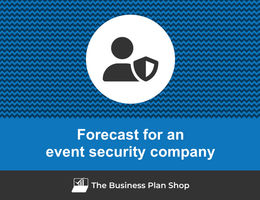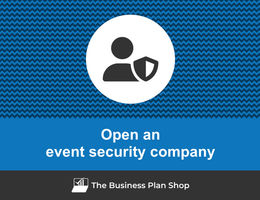How to write a business plan for an event security company?
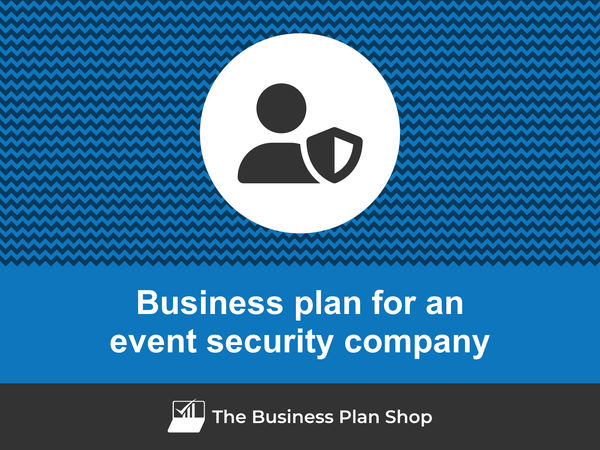
Creating a business plan for an event security company is an essential process for any entrepreneur. It serves as a roadmap that outlines the necessary steps to be taken to start or grow the business, the resources required, and the anticipated financial outcomes. It should be crafted with method and confidence.
This guide is designed to provide you with the tools and knowledge necessary for creating an event security company business plan, covering why it is so important both when starting up and running an established business, what should be included in your plan, how it should be structured, what tools should be used to save time and avoid errors, and other helpful tips.
We have a lot to cover, so let's get to it!
Why write a business plan for an event security company?
Being clear on the scope and goals of the document will make it easier to understand its structure and content. So before diving into the actual content of the plan, let's have a quick look at the main reasons why you would want to write an event security company business plan in the first place.
To have a clear roadmap to grow the business
It's rarely business as usual for small businesses. The economy follows cycles where years of growth are followed by recessions, and the business environment is always changing with new technologies, new regulations, new competitors, and new consumer behaviours appearing all the time...
In this context, running a business without a clear roadmap is like driving blindfolded: it's dangerous at best. That's why writing a business plan for an event security company is essential to create successful and sustainable businesses.
To write an effective business plan, you will need to take stock of where you are (if you are already in business) and where you want the business to go in the next three to five years.
Once you know where you want your event security company to be, you'll have to identify:
- what resources (human, equipment, and capital) are needed to get there,
- at what pace the business needs to progress to get there in time,
- and what risks you'll face along the way.
Going through this process regularly is beneficial, both for startups and existing companies, as it helps make informed decisions about how best to allocate resources to ensure the long-term success of the business.
To maintain visibility on future cash flows
Businesses can go for years without making a profit, but they go bust as soon as they run out of cash. That's why "cash is king", and maintaining visibility on your event security company's future cash flows is critical.
How do I do that? That's simple: you need an up-to-date financial forecast.
The good news is that your event security company business plan already contains a financial forecast (more on that later in this guide), so all you have to do is to keep it up-to-date.
To do this, you need to regularly compare the actual financial performance of your business to what was planned in your financial forecast, and adjust the forecast based on the current trajectory of your business.
Monitoring your event security company's financial health will enable you to identify potential financial problems (such as an unexpected cash shortfall) early and to put in place corrective measures. It will also allow you to detect and capitalize on potential growth opportunities (higher demand from a given segment of customers for example).
To secure financing
Whether you are a startup or an existing business, writing a detailed event security company business plan is essential when seeking financing from banks or investors.
This makes sense given what we've just seen: financiers want to ensure you have a clear roadmap and visibility on your future cash flows.
Banks will use the information included in the plan to assess your borrowing capacity (how much debt your business can support) and your ability to repay the loan before deciding whether they will extend credit to your business and on what terms.
Similarly, investors will review your plan carefully to assess if their investment can generate an attractive return on investment.
To do so, they will be looking for evidence that your event security company has the potential for healthy growth, profitability, and cash flow generation over time.
Now that you understand why it is important to create a business plan for an event security company, let's take a look at what information is needed to create one.
Need a convincing business plan?
The Business Plan Shop makes it easy to create a financial forecast to assess the potential profitability of your projects, and write a business plan that’ll wow investors.

Information needed to create a business plan for an event security company
Drafting an event security company business plan requires research so that you can project sales, investments and cost accurately in your financial forecast, and convince the reader that there is a viable commercial opportunity to be seized.
Below, we'll focus on three critical pieces of information you should gather before starting to write your plan.
Carrying out market research for an event security company
As you consider writing your business plan for an event security company, conducting market research becomes a vital step to ensure accurate and realistic financial projections.
Market research provides valuable insights into your target customer base, competitors, pricing strategies, and other key factors that can significantly impact the commercial success of your business.
Through this research, you may uncover trends that could influence your event security company.
1. Your market research may reveal that customers are looking for more comprehensive security services, like third-party monitoring and remote access. 2. Your market research might indicate that there is a demand for technology-based security solutions, such as automatic access control and surveillance systems.
Such market trends play a significant role in forecasting revenue, as they offer valuable data about potential customers' spending habits and preferences.
By incorporating these findings into your financial projections, you can present investors with more accurate information, helping them make informed decisions about investing in your event security company.
Developing the sales and marketing plan for an event security company
As you embark on creating your event security company business plan, it is crucial to budget sales and marketing expenses beforehand.
A well-defined sales and marketing plan should include precise projections of the actions required to acquire and retain customers. It will also outline the necessary workforce to execute these initiatives and the budget required for promotions, advertising, and other marketing efforts.
This approach ensures that the appropriate amount of resources is allocated to these activities, aligning with the sales and growth objectives outlined in your business plan.
The staffing and equipment needs of an event security company
Whether you are at the beginning stages of your event security company or expanding its horizons, having a clear plan for recruitment and capital expenditures (investment in equipment and real estate) is vital to ensure your business's success.
To achieve this, both the recruitment and investment plans must align coherently with the projected timing and level of growth in your forecast. It is essential to secure appropriate funding for these plans.
The staffing costs that an event security company might incur could include wages for security guards, supervisors, and incident response personnel, as well as any overtime costs associated with extended shifts. The equipment costs could include the purchase of uniforms, radios, and other communication devices, and the maintenance of any surveillance equipment.
To create a financial forecast that accurately represents your business's outlook, remember to factor in other day-to-day operating expenses.
Now that you have all the necessary information, it's time to dive in and start creating your business plan and developing the financial forecast for your event security company.
What goes into your event security company's financial forecast?
The financial forecast of your event security company's business plan will enable you to assess the growth, profitability, funding requirements, and cash generation potential of your business in the coming years.
The four key outputs of a financial forecast for a event security company are:
- The profit and loss (P&L) statement,
- The projected balance sheet,
- The cash flow forecast,
- And the sources and uses table.
Let's look at each of these in a bit more detail.
The projected P&L statement
Your event security company forecasted P&L statement enables the reader of your business plan to get an idea of how much revenue and profits your business is expected to make in the near future.
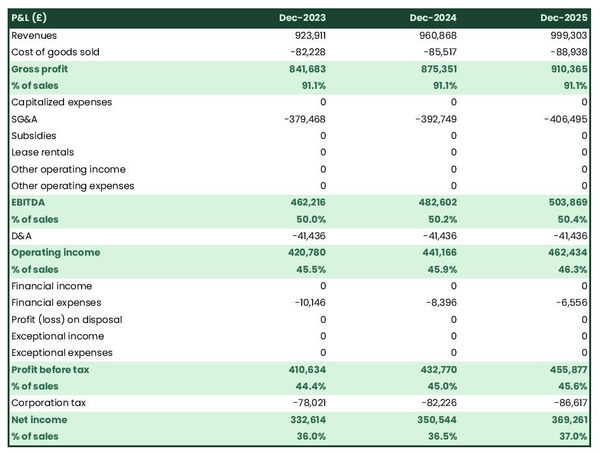
Ideally, your reader will want to see:
- Growth above the inflation level
- Expanding profit margins
- Positive net profit throughout the plan
Expectations for an established event security company will of course be different than for a startup. Existing businesses which have reached their cruising altitude might have slower growth and higher margins than ventures just being started.
The forecasted balance sheet of your event security company
The projected balance sheet of your event security company will enable the reader of your business plan to assess the overall financial health of your business.
It shows three elements: assets, liabilities and equity:
- Assets: are productive resources owned by the business, such as equipment, cash, and accounts receivable (money owed by clients).
- Liabilities: are debts owed to creditors, lenders, and other entities, such as accounts payable (money owed to suppliers).
- Equity: includes the sums invested by the shareholders or business owners and the profits and losses accumulated by the business to date (which are called retained earnings). It is a proxy for the value of the owner's stake in the business.
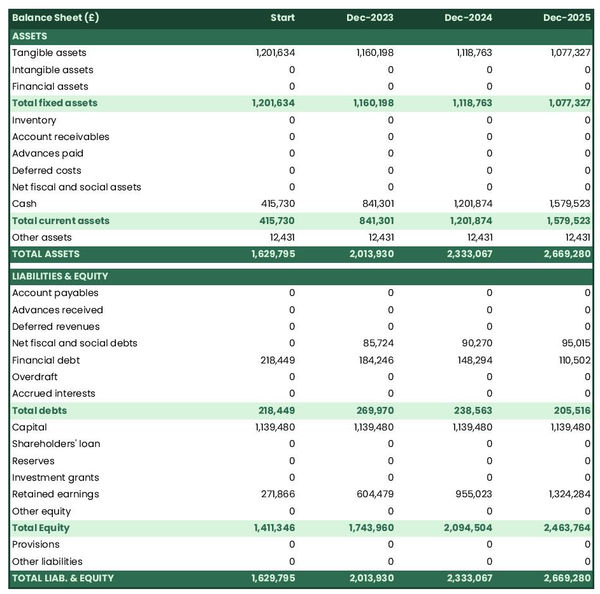
Analysing your event security company projected balance sheet provides an understanding of your event security company's working capital structure, investment and financing policies.
In particular, the readers of your plan can compare the level of financial debt on the balance sheet to the equity value to measure the level of financial risk (equity doesn't need to be reimbursed, while financial debt must be repaid, making it riskier).
They can also use your balance sheet to assess your event security company's liquidity and solvency:
- A liquidity analysis: focuses on whether or not your business has sufficient cash and short-term assets to cover its liabilities due in the next 12 months.
- A solvency analysis: takes and longer view to assess whether or not your business has the capacity to repay its debts over the medium-term.
The cash flow forecast
As we've seen earlier in this guide, monitoring future cash flows is the key to success and the only way of ensuring that your event security company has enough cash to operate.
As you can expect showing future cash flows is the main role of the cash flow forecast in your event security company business plan.
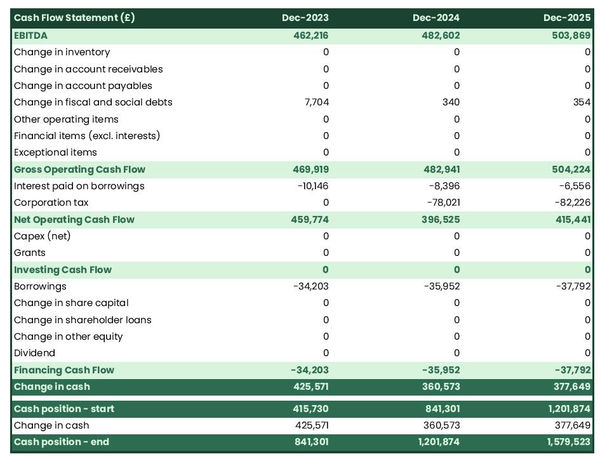
It is best practice to organise the cash flow statement by nature in order to show the cash impact of the following areas:
- Cash flow generated from operations: the operating cash flow shows how much cash is generated or consumed by the business's commercial activities
- Cash flow from investing activities: the investing cash flow shows how much cash is being invested in capital expenditure (equipment, real estate, etc.) either to maintain the business's equipment or to expand its capabilities
- Cash flow from financing activities: the financing cash flow shows how much cash is raised or distributed to financiers
Looking at the cash flow forecast helps you to make sure that your business has enough cash to keep running, and can help you anticipate potential cash shortfalls.
Your event security company business plan will normally include both yearly and monthly cash flow forecasts so that the readers can view the impact of seasonality on your business cash position and generation.
The initial financing plan
The initial financing plan - also called a sources and uses table - is an important tool when starting an event security company.
It shows where the money needed to set up the business will come from (sources) and how it will be allocated (uses).

Having this table helps understand what costs are involved in setting up the event security company, how the risks are distributed between the shareholders and the lenders, and what will be the starting cash position (which needs to be sufficient to sustain operations until the business breaks even).
Now that the financial forecast of an event security company business plan is understood, let's focus on what goes into the written part of the plan.
Need a convincing business plan?
The Business Plan Shop makes it easy to create a financial forecast to assess the potential profitability of your projects, and write a business plan that’ll wow investors.

The written part of an event security company business plan
The written part of an event security company business plan is composed of 7 main sections:
- The executive summary
- The presentation of the company
- The products and services
- The market analysis
- The strategy
- The operations
- The financial plan
Throughout these sections, you will seek to provide the reader with the details and context needed for them to form a view on whether or not your business plan is achievable and your forecast a realistic possibility.
Let's go through the content of each section in more detail!
1. The executive summary
In your event security company's business plan, the first section is the executive summary — a captivating overview of your plan that aims to pique the reader's interest and leave them eager to learn more about your business.
When crafting the executive summary, start with an introduction to your business, including its name, concept, location, how long it has been running, and what sets it apart. Briefly mention the products and services you plan to offer and your target customer profile.
Following that, provide an overview of the addressable market for your event security company, current trends, and potential growth opportunities.
Next, include a summary of key financial figures like projected revenues, profits, and cash flows.
Finally, in the "ask" section, detail any funding requirements you may have.
2. The presentation of the company
The second section in your event security company's business plan should focus on the structure and ownership, location, and management team of the company.
The structure and ownership part provides an overview of the legal structure of the business, who the owners are and how much each has invested and owns. If you are seeking financing it is important that the reader gets a clear picture of which legal entity is receiving the funds, and who controls the business.
The location part should give an overview of the premises from which the company is operating, and why that location is of particular interest (catchment area, accessibility, amenities nearby, etc.).
When describing the location of your event security company, you may want to focus on the potential for growth in the area. You could highlight the city's infrastructure, which could make it easier to expand your business in the future. You might also point out the city's proximity to major highways, airports, and public transportation, which could make it easier for you to provide services to a wider area. Additionally, you could mention the local population's enthusiasm for events such as festivals and concerts, which could lead to increased demand for your services.
Finally, you should introduce the management team. Explain each member's role, background, and experience.
It is also important to emphasize any past successes that the members of the management team have achieved, and how long they've been working together, as this will help potential lenders or investors understand why they should trust in their leadership.
3. The products and services section
The products and services section of your business plan should include a detailed description of the offerings that your company provides to its customers.
For example, your event security company might offer services such as security guards, event crowd control, and access control. Security guards can help ensure the safety of event attendees and monitor the event for potential security issues. Event crowd control can help keep the event organized and ensure that only authorized personnel enter the event. Access control can help limit access to certain areas and ensure that only authorized personnel enter those areas. These security services can help ensure the safety of event attendees and help ensure that the event is secure.
When drafting this section, you should be precise about the categories of products or services you sell, the types of customers you are targeting and how customers can buy them.
4. The market analysis
When presenting your market analysis in your event security company business plan, you should detail the customers' demographics and segmentation, target market, competition, barriers to entry, and any regulations that may apply.
The goal of this section is to help the reader understand how big and attractive your market is, and demonstrate that you have a solid understanding of the industry.
You should start with the demographics and segmentation subsection, which gives an overview of the addressable market for your event security company, the main trends in the marketplace, and introduces the different customer segments and their preferences in terms of purchasing habits and budgets.
The target market section should follow and zoom on the customer segments your event security company is targeting, and explain how your products and services meet the specific needs of these customers.
For example, your target market might include large-scale event hosts. This segment of customers tends to be interested in top-of-the-line security services and experiences for their events. They are willing to invest in quality event security services to ensure a safe and secure experience for their attendees.
Then comes the competition subsection, where you should introduce your main competitors and explain what differentiates you from them.
Finally, you should finish your market analysis by giving an overview of the main regulations applicable to your event security company.
5. The strategy section
When writing the strategy section of a business plan for your event security company, it is essential to include information about your competitive edge, pricing strategy, sales & marketing plan, milestones, and risks and mitigants.
The competitive edge subsection should explain what sets your company apart from its competitors. This part is especially key if you are writing the business plan of a startup, as you have to make a name for yourself in the marketplace against established players.
The pricing strategy subsection should demonstrate how you intend to remain profitable while still offering competitive prices to your customers.
The sales & marketing plan should outline how you intend to reach out and acquire new customers, as well as retain existing ones with loyalty programs or special offers.
The milestones subsection should outline what your company has achieved to date, and its main objectives for the years to come - along with dates so that everyone involved has clear expectations of when progress can be expected.
The risks and mitigants subsection should list the main risks that jeopardize the execution of your plan and explain what measures you have taken to minimize these. This is essential in order for investors or lenders to feel secure in investing in your venture.
Your event security company could face a variety of risks. For example, the company could be subject to liability if an incident occurs at an event that they are hired to secure. The company could also face the risk of theft or vandalism of its own equipment, as well as the equipment of the event attendees. The company might also face the risk of legal action if it is found to be in violation of any laws or regulations governing the event. These risks could have a significant impact on the company’s ability to deliver a safe and secure event experience.
6. The operations section
In your business plan, it's also essential to provide a detailed overview of the operations of your event security company.
Start by covering your team, highlighting key roles and your recruitment plan to support the expected growth. Outline the qualifications and experience required for each role and your intended recruitment methods, whether through job boards, referrals, or headhunters.
Next, clearly state your event security company's operating hours, allowing the reader to assess staffing levels adequately. Additionally, mention any plans for varying opening times during peak seasons and how you'll handle customer queries outside normal operating hours.
Then, shift your focus to the key assets and intellectual property (IP) necessary for your business. If you rely on licenses, trademarks, physical structures like equipment or property, or lease agreements, make sure to include them in this section.
You could have key assets such as surveillance technology and access control systems. These may provide you with the ability to monitor and secure your event space. Additionally, you might have intellectual property surrounding the processes you use to secure an event. This could include protocols, checklists, and training materials that you use to develop and maintain your event security team.
Lastly, include a list of suppliers you plan to work with, detailing their services and main commercial terms, such as price, payment terms, and contract duration. Investors are interested in understanding why you've chosen specific suppliers, which may be due to higher-quality products or established relationships from previous ventures.
7. The presentation of the financial plan
The financial plan section is where we will include the financial forecast we talked about earlier in this guide.
Now that you have a clear idea of the content of an event security company business plan, let's look at some of the tools you can use to create yours.
What tool should I use to write my event security company's business plan?
In this section, we will be reviewing the two main solutions for creating an event security company business plan:
- Using specialized online business plan software,
- Outsourcing the plan to the business plan writer.
Using an online business plan software for your event security company's business plan
Using online business planning software is the most efficient and modern way to create an event security company business plan.
There are several advantages to using specialized software:
- You can easily create your financial forecast by letting the software take care of the financial calculations for you without errors
- You are guided through the writing process by detailed instructions and examples for each part of the plan
- You can access a library of dozens of complete business plan samples and templates for inspiration
- You get a professional business plan, formatted and ready to be sent to your bank or investors
- You can easily track your actual financial performance against your financial forecast
- You can create scenarios to stress test your forecast's main assumptions
- You can easily update your forecast as time goes by to maintain visibility on future cash flows
- You have a friendly support team on standby to assist you when you are stuck
If you're interested in using this type of solution, you can try The Business Plan Shop for free by signing up here.
Need a convincing business plan?
The Business Plan Shop makes it easy to create a financial forecast to assess the potential profitability of your projects, and write a business plan that’ll wow investors.

Hiring a business plan writer to write your event security company's business plan
Outsourcing your event security company business plan to a business plan writer can also be a viable option.
Business plan writers are experienced in writing business plans and adept at creating financial forecasts without errors. Furthermore, hiring a consultant can save you time and allow you to focus on the day-to-day operations of your business.
However, hiring business plan writers is expensive as you are paying for the software used by the consultant, plus their time, and their profit margin of course.
From experience, you need to budget at least £1.5k ($2.0k) excluding tax for a complete business plan, more if you need to make changes after the initial version (which happens frequently after the initial meetings with lenders or investors).
You also need to be careful when seeking investment. Investors want their money to be used to grow the business, not spent on consulting fees. Therefore, the amount you spend on business plan writing services (and other consulting services such as legal services) needs to be negligible relative to the amount raised.
The other drawback is that you usually don't own the business plan itself: you just get the output, while the actual document is saved in the consultant's business plan software - which makes it difficult to maintain the document up to date without hiring the consultant on a retainer.
For these reasons, outsourcing the event security company business plan to a business plan writer should be considered carefully, weighing both the advantages and disadvantages of hiring outside help.
Ultimately, it may be the right decision for some businesses, while others may find it beneficial to write their business plan using online software.
Why not create your event security company's business plan using Word or Excel?
I must advise against using Microsoft Excel and Word (or their Google, Apple, or open-source equivalents) to write your event security company business plan. Let me explain why.
Firstly, creating an accurate and error-free financial forecast on Excel (or any spreadsheet) is highly technical and requires a strong grasp of accounting principles and financial modelling skills. It is, therefore, unlikely that anyone will fully trust your numbers unless you have both a degree in finance and accounting and significant financial modelling experience, like us at The Business Plan Shop.
Secondly, relying on spreadsheets is inefficient. While it may have been the only option in the past, technology has advanced significantly, and software can now perform these tasks much faster and with greater accuracy. With the rise of AI, software can even help us detect mistakes in forecasts and analyze the numbers for better decision-making.
And with the rise of AI, software is also becoming smarter at helping us detect mistakes in our forecasts and helping us analyse the numbers to make better decisions.
Moreover, software makes it easier to compare actuals versus forecasts and maintain up-to-date forecasts to keep visibility on future cash flows, as we discussed earlier in this guide. This task is cumbersome when using spreadsheets.
Now, let's talk about the written part of your event security company business plan. While it may be less error-prone, using software can bring tremendous gains in productivity. Word processors, for example, lack instructions and examples for each part of your business plan. They also won't automatically update your numbers when changes occur in your forecast, and they don't handle formatting for you.
Overall, while Word or Excel may seem viable for some entrepreneurs to create a business plan, it's by far becoming an antiquated way of doing things.
Takeaways
- Using business plan software is a modern and cost-effective way of writing and maintaining business plans.
- A business plan is not a one-shot exercise as maintaining it current is the only way to keep visibility on your future cash flows.
- A business plan has 2 main parts: a financial forecast outlining the funding requirements of your event security company and the expected growth, profits and cash flows for the next 3 to 5 years; and a written part which gives the reader the information needed to decide if they believe the forecast is achievable.
We hope that this in-depth guide met your expectations and that you now have a clear understanding of how to write your event security company business plan. Do not hesitate to contact our friendly team if you have questions additional questions we haven't addressed here.
Also on The Business Plan Shop
- How to write a business plan to secure a bank loan?
- How to write the products and services section of your business plan
- How to write the suppliers section of your business plan?
- How to describe your business premises in a business plan
- Key steps to write a business plan?
- Top mistakes to avoid in your business plan
Do you know entrepreneurs interested in starting or growing an event security company? Share this article with them!


